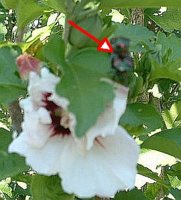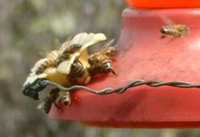Well,, nice that there are bees, but sorry about the beetles...are they the japanese rose beetles?  except those come out at night...anything you spray on them will affect the bees, unless you do it at night or really early when the bees are not active and use an organic approved foliar spray like neem oil.
except those come out at night...anything you spray on them will affect the bees, unless you do it at night or really early when the bees are not active and use an organic approved foliar spray like neem oil.
i have the same problem...cant do cucumbers because of the pickleworms, and its hard to hit the sweet spot of spraying so the bees are not in contact with the spray, even though the spray is organic it is still not good for bees....
I have japanese rose beetles and we pick them off in the evening and put them in soapy water, this seems to knock the population back, but i only have small bushes, and it looks like you have lots of trees etc....
 except those come out at night...anything you spray on them will affect the bees, unless you do it at night or really early when the bees are not active and use an organic approved foliar spray like neem oil.
except those come out at night...anything you spray on them will affect the bees, unless you do it at night or really early when the bees are not active and use an organic approved foliar spray like neem oil.i have the same problem...cant do cucumbers because of the pickleworms, and its hard to hit the sweet spot of spraying so the bees are not in contact with the spray, even though the spray is organic it is still not good for bees....
I have japanese rose beetles and we pick them off in the evening and put them in soapy water, this seems to knock the population back, but i only have small bushes, and it looks like you have lots of trees etc....


 Two of the three swarms were calls from homeowners near me who woke up to bees in their yards....SURPRISE!!! They are all happily resettled in hive boxes (one swarm was my own bees who went next door, the stinkers).
Two of the three swarms were calls from homeowners near me who woke up to bees in their yards....SURPRISE!!! They are all happily resettled in hive boxes (one swarm was my own bees who went next door, the stinkers).


